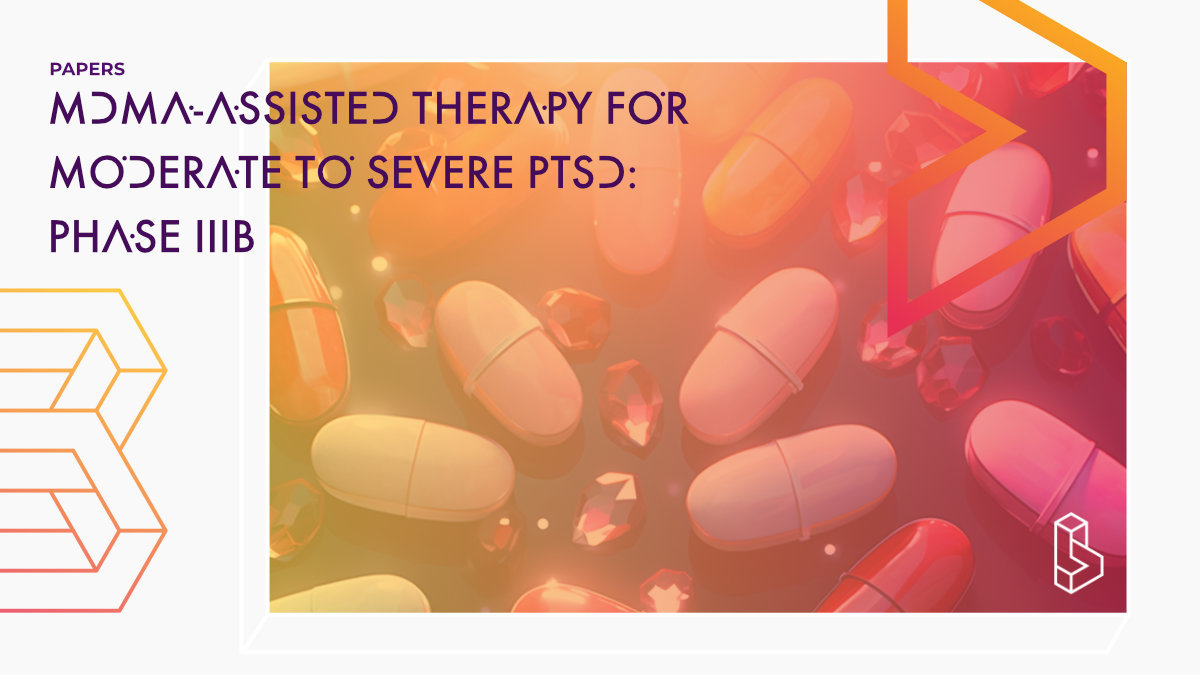This multi-site, randomized, double-blind, Phase IIIb trial (n=104) evaluated the efficacy and safety of MDMA-assisted therapy (MDMA-AT; 3x 80-120mg) for individuals with moderate to severe PTSD. The study found significant reductions in PTSD severity (CAPS-5 score) and functional impairment (SDS score) for the MDMA-AT group compared to placebo with therapy. Seven participants experienced severe treatment-emergent adverse events, but no deaths or serious adverse events were reported. The treatment was found to be generally well tolerated in a diverse population.
Abstract of MDMA-assisted therapy for moderate to severe PTSD: Phase IIIb
“This multi-site, randomized, double-blind, confirmatory phase 3 study evaluated the efficacy and safety of 3,4-methylenedioxymethamphetamine-assisted therapy (MDMA-AT) versus placebo with identical therapy in participants with moderate to severe post-traumatic stress disorder (PTSD). Changes in Clinician-Administered PTSD Scale for DSM-5 (CAPS-5) total severity score (primary endpoint) and Sheehan Disability Scale (SDS) functional impairment score (key secondary endpoint) were assessed by blinded independent assessors. Participants were randomized to MDMA-AT (n = 53) or placebo with therapy (n = 51). Overall, 26.9% (28/104) of participants had moderate PTSD, and 73.1% (76/104) of participants had severe PTSD. Participants were ethnoracially diverse: 28 of 104 (26.9%) identified as Hispanic/Latino, and 35 of 104 (33.7%) identified as other than White. Least squares (LS) mean change in CAPS-5 score (95% confidence interval (CI)) was −23.7 (−26.94, −20.44) for MDMA-AT versus −14.8 (−18.28, −11.28) for placebo with therapy (P < 0.001, d = 0.7). LS mean change in SDS score (95% CI) was −3.3 (−4.03, −2.60) for MDMA-AT versus −2.1 (−2.89, −1.33) for placebo with therapy (P = 0.03, d = 0.4). Seven participants had a severe treatment emergent adverse event (TEAE) (MDMA-AT, n = 5 (9.4%); placebo with therapy, n = 2 (3.9%)). There were no deaths or serious TEAEs. These data suggest that MDMA-AT reduced PTSD symptoms and functional impairment in a diverse population with moderate to severe PTSD and was generally well tolerated.“
Authors: Jennifer M. Mitchell, Marcela Ot’alora G., Bessel van der Kolk, Scott Shannon, Michael Bogenschutz, Yevgeniy Gelfand, Casey Paleos, Christopher R. Nicholas, Sylvestre Quevedo, Brooke Balliett, Scott Hamilton, Michael Mithoefer, Sarah Kleiman, Kelly Parker-Guilbert, Keren Tzarfaty, Charlotte Harrison, Alberdina de Boer, Rick Doblin & Berra Yazar-Klosinski
Summary of MDMA-assisted therapy for moderate to severe PTSD: Phase IIIb
Post-traumatic stress disorder (PTSD) affects approximately 5% of the US annually. Trauma-focused psychotherapies are the gold standard treatment for a disproportionately higher risk of developing PTSD, but these diverse populations are historically underrepresented in clinical trials.
Mounting evidence supports substituted phenethylamine 3,4-methylenedioxymethamphetamine-assisted therapy (MDMA-AT) as a treatment for PTSD. MDMA-AT reduces PTSD symptoms and promotes openness and prosocial behaviour.
The summary of this seminal article is available to all members (including free members). Join here!
Find this paper
MDMA-assisted therapy for moderate to severe PTSD: a randomized, placebo-controlled phase 3 trial
https://doi.org/10.1038/s41591-023-02565-4
Open Access | Google Scholar | Backup | 🕊
Cite this paper (APA)
Mitchell, J.M., Ot’alora G., M., van der Kolk, B. et al. MDMA-assisted therapy for moderate to severe PTSD: a randomized, placebo-controlled phase 3 trial. Nat Med (2023). https://doi.org/10.1038/s41591-023-02565-4
Authors
Authors associated with this publication with profiles on Blossom
Rick DoblinRick Doblin Ph.D. is the founder of MAPS. His persistent work since 1986 has been one of the main drivers behind why psychedelics (including MDMA) are now coming back to therapy.
Institutes
Institutes associated with this publication
MAPS PBCMAPS Public Benefit Corporation (MAPS PBC) is the 'benefit above profit' corporation that is fully owned by MAPS.
MAPS
MAPS stands for Multidisciplinary Association for Psychedelic Studies, it's the front runner in making psychedelics a legal way to use (and improve) in therapy.
Compound Details
The psychedelics given at which dose and how many times
MDMA 80 - 120mg | 3x
Linked Research Papers
Notable research papers that build on or are influenced by this paper
The conceptual framework for the therapeutic approach used in phase 3 trials of MDMA-assisted therapy for PTSDThis theoretical framework paper analyses two Phase III trials of MDMA-assisted therapy for PTSD, describing the conceptual underpinnings and therapeutic approach. It explains how the treatment combines three MDMA-facilitated sessions with non-drug psychotherapy sessions, emphasizing the patient's "inner healing intelligence" as the primary change agent and the therapeutic relationship as the core facilitating condition.
Cost-effectiveness of midomafetamine-assisted therapy (MDMA-AT) in chronic and treatment-resistant post-traumatic stress disorder of moderate or higher severity: A health-economic model
This cost-effectiveness analysis compares MDMA-assisted therapy (MDMA-AT) versus placebo with therapy (PT) for chronic PTSD treatment over 5 years. Using a health state-transition model, it finds MDMA-AT to be cost-effective with an ICER of $83,845 per QALY (below the $150,000 willingness-to-pay threshold), despite higher intervention costs ($48,376 vs $12,376), due to reduced healthcare visits and better health outcomes (0.377 QALY increment).
MDMA-assisted therapy for severe PTSD: a randomized, double-blind, placebo-controlled phase 3 study
This double-blind, placebo-controlled study (n=90) finds that MDMA-assisted therapy (3x 80-120mg) is effective (d=.91, large effect size) in the treatment of PTSD. 67% of those in the MDMA-group no longer qualified for PTSD (vs 32% for the therapy-only group). This study is part of the Phase III trial to get MDMA approved by the FDA.
Linked Clinical Trial
A Multi-Site Phase 3 Study of MDMA-Assisted Psychotherapy for PTSDPosttraumatic stress disorder (PTSD) is a debilitating psychiatric disorder that can develop after a traumatic life experience that severely reduces the quality of life. This multi-site, double-blind, placebo-controlled, randomized Phase 3 study will assess the efficacy and safety MDMA-assisted psychotherapy compared to psychotherapy with placebo in participants diagnosed with at least moderate PTSD.

